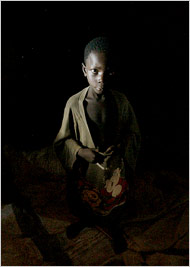Indentured Servants...today?!

Today, around the world, an estimated 1.2 million children are being sold as indentured servants by their parents or relatives. The majority of the child trafficking occurs in Asia, Latin America and Africa. Mark Kwadwo is a six year old boy who lives Ghana, Africa. He awakes at 5.a.m. and spends his day doing the work of a grown fisherman. He is subject to abuse and he sleeps on a dirt floor. He works about one hundred hours a week. He and many other child indentured servants are under clothed and malnourished. His family receives as little as twenty dollars a year for his services. Why would a family send a child to live such a horrid life? In Ghana, the idea of a nuclear family is not central and often children are sent to relatives if a brighter future is more likely there. Some families believe that learning a trade will be more helpful than staying home, where they would simply starve. Sometimes it is the choice between sending the child to become an indentured servant and having their family starve to death. Another reason that this policy is occurring is that people in Ghana do not see it necessary to educate children. Furthermore, they need the children in order to succeed with their businesses. Reports about mistreatment of children have pushed forward legislative acts against trafficking children.
The child labor laws in America are much stricter and longer established than those in Africa. However, before the child labor laws were enacted children in America also suffered in hazardous work settings. Before the laws were passed, the workweek varied from sixty eight to seventy two hours. Similar to the situation in Ghana today, the employment of poor children was seen as a benefit to the community. In the end of the nineteenth century, child labor laws were being passed on the state level. They were often ignored and attempts on the national level were stopped by talk of the laws being unconstitutional. Finally in 1904, the National Labor committee was founded. Oftentimes, companies under inspection were quick to hide children because violations of labor laws were occurring. In 1941, The Fair Labor Standards Act was made constitutional. The act set many regulations, such as how many hours a child could work and minimum wage. Africa is working on passing similar laws to protect their children.

0 Comments:
Post a Comment
<< Home